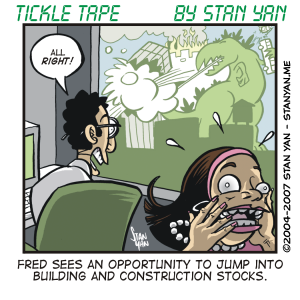Looking at your screen can be much like looking at a slot machine, and stopping yourself from dropping a dollar in the slot and pulling the handle. You must restrain yourself from making an impulsive trade, but there’s a very human tendency to seek out excitement and receive a quick reward. You must fight temptation and maintain self-control, however.
Electronic trading platforms have made trades easier to execute, but at the same time, they’ve made trade execution so fast and easy that many novice traders overtrade, and even when traders don’t overtrade, they may be tempted to constantly monitor their trades and abandon trading plans prematurely, a common ailment of novice and seasoned traders alike. Practicing patience can help you stick with your trading plan until it comes to fruition.
Impulsive trading doesn’t happen in a vacuum. Many factors contribute to prematurely abandoning a trading plan. A significant precursor, though, is a feeling of boredom. When we are bored, we may want to spice things up, and what better way to put a little excitement into life than looking at a position to see how well things are going. What’s the problem? The more you look at how a trade is going, the more you think about it, and if your plan is to patiently wait for a week or longer, looking can only make you feel like you want to take action. It’s necessary to remove temptation.
Don’t think you are a hero. The biggest mistake traders make is thinking that they have superhuman self-discipline. Do you remember the “Got Milk?” commercial from a couple of years ago? Imagine eating a frosted cupcake and trying to stop yourself from drinking a glass of milk. You could try it, but it wouldn’t be easy. Rather than put yourself in such a situation, it’s easier to avoid eating the cupcake altogether. It’s the same with trading: Avoid looking at the market action unless it is a necessary part of your trading plan.
How else can you maintain discipline? First, admit your limitations. Self-control is like a muscle. You need to practice self-control. Don’t try to be superhuman. You can’t run a marathon tomorrow if the farthest you had to run in the past year was between your front door and your car when you were late for an appointment. You need to work up to it. Don’t expect to be able to maintain self-control without extensive practice. Give yourself time to build up your self-control skills. Second, make a strong commitment to building up your self-control skills. Take the matter seriously.
Until you commit to change, you cannot improve your ability to maintain discipline. It’s similar to losing weight or quitting smoking. A person must first acknowledge that he or she has difficulty with self-control before a change can happen. Admitting that you need to improve your self-control skills goes a long way. Third, you must use psychological techniques to learn to maintain discipline.
It is essential to monitor your self-talk. The kind of self-talk that most people have when they lose control is, “I need a little excitement. Let’s see how my positions are doing.” When you look, however, you’ll bring the emotions regarding your trade into your consciousness. You’ll start thinking of how well or poorly the trade is going, and when you start thinking about it, you will be putting a strain on your self-control “muscles.” It’s useful to remind yourself that you can maintain control: “I can wait if I try. I just need to concentrate.”
Fourth, when you start thinking about making an impulsive move, immediately run away from your screen until you “cool off” and allow your emotions to dissipate. In the old days, brokers helped prevent traders from acting too impulsively. Having to call a broker provided a cooling-off period. A trader may have wanted to change his or her trading strategy prematurely, but it wasn’t as simple as clicking a mouse to execute a trade. A trader had to call up the broker and deal with the interpersonal issues of what he or she might think.
A trader was likely to stop and think, “I don’t want my broker to think that I’m wishy-washy, impulsive, or timid, let me think about this a little more.” But these days, you can go to your computer and buy, sell, and re-buy a position in a matter of minutes. An obvious remedy to impulsive overtrading is to use a broker to place your trades. Another solution is to acknowledge that looking at your screen too soon is a temptation, and avoid looking at it as much as possible.
And if you do catch yourself looking, leave the room as soon as possible before you take an action you don’t want to take. Don’t trade impulsively. The winning trader is a disciplined trader. The more you can stay calm, rational, and in control, the more profits you’ll take home.


